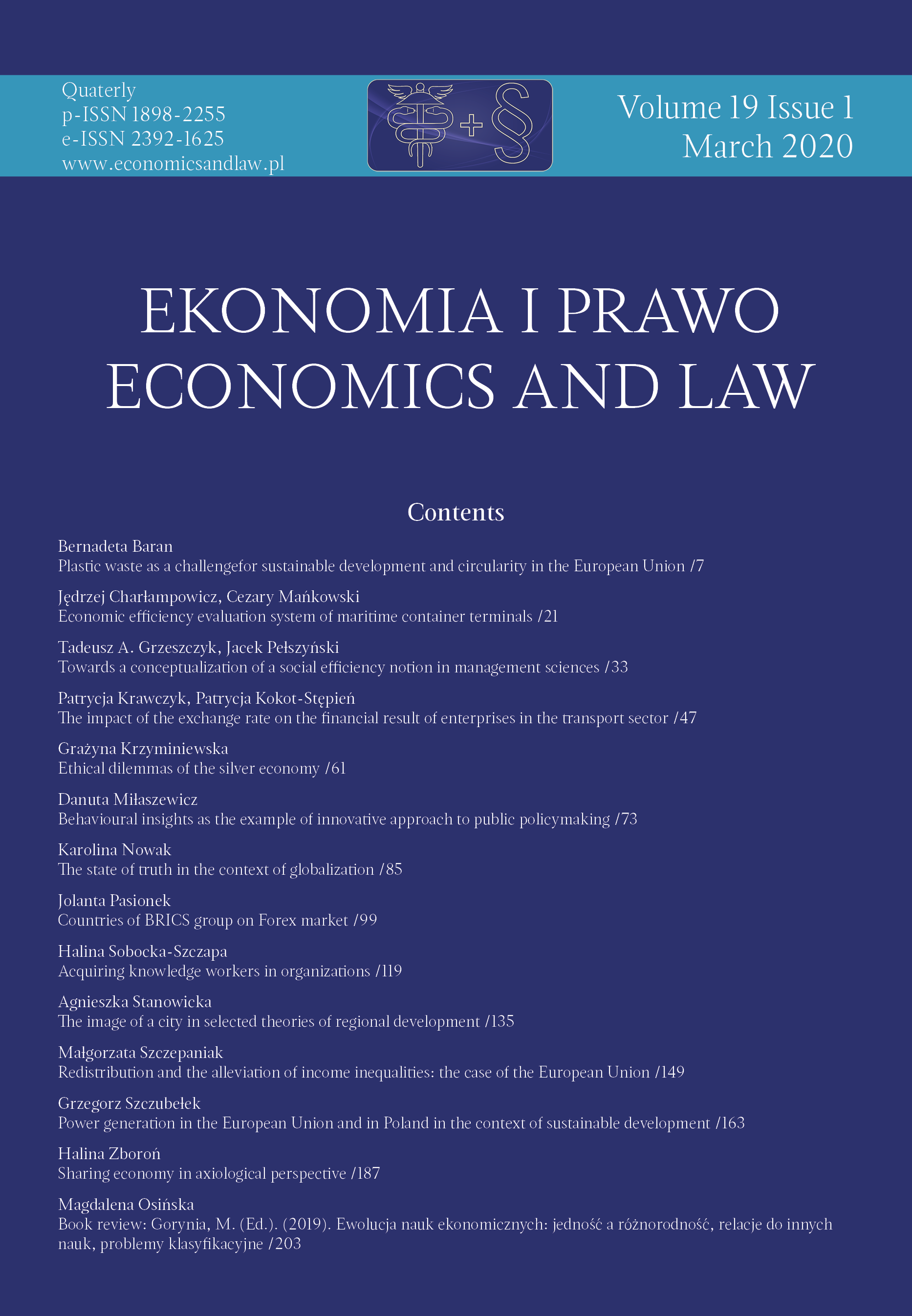Towards a conceptualization of a social efficiency notion in management sciences
DOI:
https://doi.org/10.12775/EiP.2020.003Keywords
efficiency evaluation, social efficiency conceptualization, project management, terminologyAbstract
Motivation: In the past, economic efficiency was a key criterion for assessing different types of activities undertaken by various organizations. It has been noticed that acquiring economic efficiency cannot be the only goal, and efficiency notion has many meanings. Processes and projects should be economically effective, at the same time being harmful to different social interests. There are difficulties in understanding and conceptualization of social efficiency notion in management sciences research, and, in particular, in the area of project management.
Aim: This research aims to contribute to filling the gap concerning a conceptualization of a social efficiency notion in management sciences, with particular emphasis on the field of project management.
Results: Achieving paper goal may simplify communication in the scientific community using the social efficiency concept, exchange of scientific information, further work related to operationalization of this concept and development methods for its measurement. Further work on social efficiency evaluation methods may facilitate considerations regarding the transition from the social efficiency notion phase to the concept phase and the idea of using social points for estimating obtained social effects. This opens the way for the development of more objective measurement principles and methods that do not require monetization of social impact, which is now commonly used e.g. in models like Social Return on Investment.
References
Angelopoulos, K., Philippopoulos, A. & Tsionas, E. (2008). Does public sector effi-ciency matter? Revisiting the relation between fiscal size and economic growth in a world sample. Public Choice, 137(1–2), doi:10.1007/s11127-008-9324-8.
Balcerzak, A.P., & Pietrzak, M. (2015). Research and development expenditures and quality of life in European Union countries. Ekonomia i Prawo. Economics and Law, 14(3). doi:10.12775/EiP.2015.018.
Crafa, D., Liu, J., & Brodeur, M.B. (2019). Social values and determinants of cultural fit in Quebec: the roles of ancestry, inguistic group, and mental health status. Frontiers in Psychology, 10. doi:10.3389/fpsyg.2019.00287.
Czaplak, J. (2016). Analysis of the effectiveness of public services provision by local governments in the years 2007–2013. Oeconomia Copernicana, 7(2). doi:10.12775/OeC.2016.014.
Diallo, A., & Thuillier, D. (2005). The success of international development projects, trust and communication: an African perspective. International Journal of Project Management, 23(3). doi:10.1016/j.ijproman.2004.10.002.
Glodzinski, E. (2018). Project assessment framework: multidimensional efficiency approach applicable for project-driven organizations. Procedia Computer Science, 138. doi:10.1016/j.procs.2018.10.096.
Griffin, R.W. (2015). Fundamentals of management. Mason: South-Western Cengage Learning.
Grmanova, E., & Pukala, R. (2018). Efficiency of insurance companies in the Czech Republic and Poland. Oeconomia Copernicana, 9(1). doi:10.24136/oc.2018.004.
Grzeszczyk, T.A., & Czajkowski, B. (2017). EU-funded project management in the context of suppliers and contractors selection. Procedia Engineering, 182. doi:10.1016/j.proeng.2017.03.181.
Grzeszczyk, T.A., & Klimek, D. (2018). The model of social innovation project evaluation. In J. Niu, & Z. Wang (Eds.), Proceedings of the Asia-Pacific Social Science and Modern Education Conference. Shanghai: Atlantis Press. doi:10.2991/ssme-18.2018.26.
Grzeszczyk, T.A., & Pelszynski, J. (2019). Unscrambling the concept of project social efficiency evaluation based on management sciences. In A.P. Balcerzak, & I. Pietryka (Eds.), Proceedings of the 10th International Conference on Applied Economics Contemporary Issues in Economy: Entrepreneurship and Management. Olsztyn: Institute of Economic Research. doi:10.24136/eep.proc.2019.4.
Jankalov, M., & Jankal, R. (2017). The assessment of corporate social responsibility: approaches analysis. Entrepreneurship and Sustainability Issues, 4(4). doi:10.9770/jesi.2017.4.4(4).
Kaufmann, W., Taggart, G., & Bozeman, B. (2019). Administrative delay, red tape, and organizational performance. Public Performance & Management Review, 42(3). doi:10.1080/15309576.2018.1474770.
Kolb, R.W. (Ed.). (2018). The Sage encyclopedia of business ethics and society. Los Angeles: Sage.
Kostalova, J., Tetrevova, L., & Patak, M. (2017). Project management methods in projects co-financed by EU funds. Engineering Economics, 28(3). doi:10.5755/j01.ee.28.3.13651.
Krajnakova, E., Navickas, V., & Kontautiene, R. (2018). Effect of macroeconomic business environment on the development of corporate social responsibility in Baltic Countries and Slovakia. Oeconomia Copernicana, 9(3). doi:10.24136/oc.2018.024.
Lefeber, L., & Vietorisz, T. (2007). The meaning of social efficiency. Review of Political Economy, 19(2). doi:10.1080/09538250701256672.
Millar, R., & Hall, K. (2013). Social return on investment (SROI) and performance measurement: the opportunities and barriers for social enterprises in health and social care. Public Management Review, 15(6). doi:10.1080/14719037.2012.698857.
Parsons, R., Everingham, J., & Kemp, D. (2019). Developing social impact assessment guidelines in a pre-existing policy context. Impact Assessment and Project Appraisal, 37(2). doi:10.1080/14615517.2018.1485612.
Pashkevych, M., Kharchenko, M., & Shishkova, N. (2018). Oval-sustainability in entrepreneurship. Open Economics, 1(1). doi:10.1515/openec-2018-0008.
Pavlova, I., & Senfelde, M. (2017). The impact on the population on the sustainable urban economic development. Entrepreneurship and Sustainability Issues, 5(2). doi:10.9770/jesi.2017.5.2(12).
Prause, G., & Hunke, K. (2014). Sustainable entrepreneurship along green corridors. Entrepreneurship and Sustainability Issues, 1(3). doi:10.9770/jesi.2014.1.3(1).
Sabini, L., Muzio, D., & Alderman, N. (2019). 25 years of ‘sustainable projects’: what we know and what the literature says. International Journal of Project Management, 37(6). doi:10.1016/j.ijproman.2019.05.002.
Sagna, B.K. (2004). Cultural impact assessment project: framework for cultural impact assessment. Retrieved 19.12.2019 from http://dmeforpeace.org.
Scriven, M. (1991). Evaluation thesaurus. Newbury Park: Sage.
Suter, G.W., & Cormier, S.M. (2008). A theory of practice for environmental assessment. Integrated Environmental Assessment and Management, 4(4). doi:10.1897/ieam_2008-004.1.
Szaruga, E., Skąpska, E., Załoga, E., & Matwiejczuk, W. (2018). Trust and distress prediction in modal shift potential of long-distance road freight in containers: modeling approach in transport services for sustainability. Sustainability, 10(7). doi:10.3390/su10072370.
Toledo, R.F. de, Miranda Junior, H.L., Farias Filho, J.R., & Costa, H.G. (2019). A scientometric review of global research on sustainability and project management dataset. Data in Brief, 25. doi:10.1016/j.dib.2019.104312.
Wight, J.B. (2017). The ethics behind efficiency. The Journal of Economic Education, 48(1). doi:10.1080/00220485.2016.1252294.
Wong, C.H.M., & Ho, W. (2015). Roles of social impact assessment practitioners. Environmental Impact Assessment Review, 50. doi:10.1016/j.eiar.2014.09.008.
Downloads
Published
How to Cite
Issue
Section
Stats
Number of views and downloads: 941
Number of citations: 0
